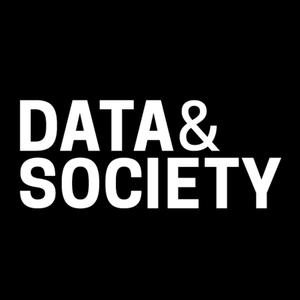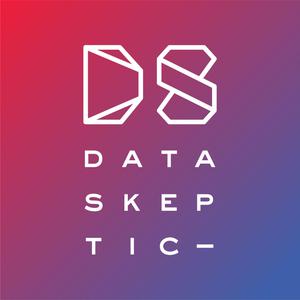
Data & Society
Data & Society
Presenting timely conversations about the purpose and power of technology that bridge our interdisciplinary research with broader public conversations about the societal implications of data and automation. For more information, visit datasociety.net.
- 1 hour 2 minutesLiving in the Shadow of AI and Data (Code Dependent by Madhumita Murgia) | Network Book Forum
On November 14, in a conversation moderated by Data & Society Senior Researcher Ranjit Singh, Madhumita Murgia and Armin Samii discussed Murgia’s new book, Code Dependent: Living in the Shadow of AI. Together, they explored living with data by describing their journeys into understanding it, reporting on it, and resisting it. While Murgia’s journalistic journey began with tracing the flow of her personal data sold by data brokers, Samii used his expertise as a computer scientist to build UberCheats, an algorithm auditing tool that extracts GPS coordinates from UberEats receipts to calculate the difference between the actual miles a courier traveled and those Uber claimed they did. In Code Dependent, Samii’s story is the focus of a chapter on how data-driven systems come to play the role of the boss.
Purchase a copy of Code Dependent: https://bookshop.org/a/14284/9781250867391
Learn more at datasociety.net (https://datasociety.net)
19 November 2024, 3:00 pm - 1 hour 28 minutesData & Society at 10: Foreseeable Futures
When Data & Society was founded ten years ago, it was rooted in the insight that data-centric technologies have broad and often unseen impacts on society — and that to better understand those impacts and realize technologies that reflect our highest values, we need interdisciplinary, empirical research.
Today, the urgency of that vision is palpable: How societies choose to design and govern technology will determine our collective future. On September 26, we celebrated our first decade with our incredible network of alumni, friends, and supporters. Along with reflections from Data & Society Executive Director Janet Haven, Board President Charlton McIlwain, and Founder danah boyd, the program included a panel discussion and lightning talks.
00:00 Opening
00:10 Welcome | Charlton McIlwain, Board President
08:23 Creating a Field | danah boyd, Founder
19:37 Lightning Talk: Xiaowei R. Wang
27:02 Lightning Talk: Ranjit Singh
33:09 Lightning Talk: Zara Rahman
38:42 Lightning Talk: Michelle Miller
46:00 Acting on What We Know | Alondra Nelson, John Palfrey, Felicia Wong (moderator: Suresh Venkatasubramanian)
1:13:47 Creating Our Future | Janet Haven, Executive Director
1:25:42 Closing | Charlton McIlwain, Board President16 October 2024, 4:17 pm - 58 minutes 43 seconds[Databite 160] Black Maternal Health is in Crisis. Can Technology Help?
In the United States, Black maternal health is in steep decline. Despite increased awareness and better data about the depths of racial health disparities, outcomes for Black birthing people remain poor. At the same time, a revolution in healthcare technologies is underway, and as they provide care at the frontlines of a crisis, birth workers are figuring out how to make digital health technologies work for them and their patients.
In "Establishing Vigilant Care: Data Infrastructures and the Black Birthing Experience," Joan Mukogosi explores how digital health technologies can produce new forms of harm for Black birthing people — by exposing Black patients to carceral systems, creating information silos that impede interoperability, and failing to meet privacy standards. By paying close attention to how clinical contexts and their associated digital technologies impact how care is delivered, this research offers a glimpse into possibilities for improved cohesion between digital health technologies and birth work.
Learn more about Data & Society at datasociety.net.
22 July 2024, 6:29 pm - 1 hour 21 minutes[Podcast] The Formalization of Social PrecaritiesThe Formalization of Social Precarities podcast explores platformization from the point of view of precarious gig workers in the Majority World. This conversation was moderated by Aiha Nguyen and Murali Shanmugavelan featuring the voices of Ambika Tandon, Ludmilla Costhek Abílio, and Ananya Raihan. You will also be hearing the experience of two platform workers interviewed for this project: Fatema Begum from Bangladesh and Nicolas Sauza from Brazil. Their voices are narrated in English by Data & Society staff members Iretiolu Akinrinade and Rigoberto Lara Guzmán, respectively. This podcast was edited by Sam Grant.16 May 2024, 5:20 pm
- 1 hour 52 seconds[Databite 159] Doing the Work: Therapeutic Labor, Teletherapy, and the Platformization of Mental Health CareData & Society’s report, Doing the Work: Therapeutic Labor, Teletherapy, and the Platformization of Mental Health Care, written by Livia Garofalo, explores how these new arrangements of therapeutic labor are affecting how therapists provide care and make a living in the US. By focusing on the experiences of providers who practice teletherapy and work for digital platforms, our research examines the fundamental tensions that emerge when a profession rooted in clinical expertise, licensing, and training standards meets the dynamics of platformization, productivity incentives, and algorithmic management. In this conversation, we reflected on how technology is changing the conditions of how therapists do their work, on the consequences for the present and future of therapeutic labor, and on how this might be changing our understanding of therapy itself.10 May 2024, 12:00 am
- 59 minutes 19 seconds[Databite 158] Adaptation | Generative AI's Labor Impacts
Generative AI has seeped into many corners of our lives, and threatens to upend the economy as we know it, from education to the film industry. How do workers’ encounters with it differ from their experiences with other systems of automation? How are they similar, and how might this help us understand the shape and stakes of this latest technology?
In this three-part Databite series, Data & Society’s Labor Futures program brings together creators, platform workers, call center workers, coders, therapists, and performers for conversations with technologists, researchers, journalists, and economists to complicate the story of generative AI. By centering workers’ experiences and interrogating the relationship between generative AI and underexplored issues of hierarchy, recognition, and adaptation in labor, these interdisciplinary conversations will uncover how new technological systems are impacting worker agency and power.
Learn more about the speakers, series, and references at datasociety.net.
24 April 2024, 12:00 am - 1 hour 3 minutesWhat's Trust Got To Do With It? | 'Trust Issues' Workshop Public Panel
This public keynote was part of Trust Issues, a Data & Society workshop organized by the Trustworthy Infrastructures program. That team includes Sareeta Amrute, Livia Garofalo, Robyn Caplan, Joan Mukogosi, Tiara Roxanne, and Kadija Ferryman.
28 March 2024, 12:00 am - 1 hour 58 secondsData In/Visibility (Queer Data Studies) | Network Book Forum
Purchase your own copy of Queer Data Studies here: https://bookshop.org/a/14284/9780295751979.
23 February 2024, 3:04 pm - 1 hour 6 minutes[Databite No. 157] Recognition | Generative AI's Labor Impacts
Generative AI has seeped into many corners of our lives, and threatens to upend the economy as we know it, from education to the film industry. How do workers’ encounters with it differ from their experiences with other systems of automation? How are they similar, and how might this help us understand the shape and stakes of this latest technology?
In this three-part Databite series, Data & Society’s Labor Futures program brings together creators, platform workers, call center workers, coders, therapists, and performers for conversations with technologists, researchers, journalists, and economists to complicate the story of generative AI. By centering workers’ experiences and interrogating the relationship between generative AI and underexplored issues of hierarchy, recognition, and adaptation in labor, these interdisciplinary conversations will uncover how new technological systems are impacting worker agency and power.
Learn more about the speakers, series, and references at datasociety.net.
14 February 2024, 4:00 am - 1 hour 25 seconds[Databite No. 156] Hierarchy | Generative AI's Labor Impacts
About the Series
Generative AI has seeped into many corners of our lives, and threatens to upend the economy as we know it, from education to the film industry. How do workers’ encounters with it differ from their experiences with other systems of automation? How are they similar, and how might this help us understand the shape and stakes of this latest technology?
In this three-part Databite series, Data & Society’s Labor Futures program brings together creators, platform workers, call center workers, coders, therapists, and performers for conversations with technologists, researchers, journalists, and economists to complicate the story of generative AI. By centering workers’ experiences and interrogating the relationship between generative AI and underexplored issues of hierarchy, recognition, and adaptation in labor, these interdisciplinary conversations will uncover how new technological systems are impacting worker agency and power.
Learn more about the speakers, series, and references at datasociety.net.
22 January 2024, 9:00 am - 59 minutes 56 secondsCaring for Digital Remains | Tamara Kneese and Tonia Sutherland | Network Book ForumWhen people die, they leave behind not only physical belongings, but digital ones. While they might have had specific wishes for what happens to their online profiles and accounts after their deaths, preserving these digital remains is complex and requires specialized forms of care. Because digital remains are attached to corporate platforms — which have control over what online legacies look like and how long they continue — people’s digital afterlives are not necessarily the ones they would have chosen for themselves. On November 16, Tamara Kneese and Tonia Sutherland came together for a conversation about their books, which both foreground death as a site for understanding the social values and power dynamics of our contemporary, platform-saturated world. The conversation between these two authors was moderated by Tamara K. Nopper, senior researcher with Data & Society’s Labor Futures program. Together, they explored death as a site of contestation and transformation.21 November 2023, 8:30 pm
- More Episodes? Get the App
Your feedback is valuable to us. Should you encounter any bugs, glitches, lack of functionality or other problems, please email us on [email protected] or join Moon.FM Telegram Group where you can talk directly to the dev team who are happy to answer any queries.
 FiveThirtyEight Politics
FiveThirtyEight Politics
 Deconstructed
Deconstructed
 Recode Daily
Recode Daily
 Tech Won't Save Us
Tech Won't Save Us
 The Ezra Klein Show
The Ezra Klein Show
 Data Skeptic
Data Skeptic